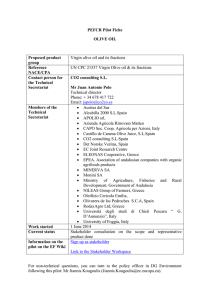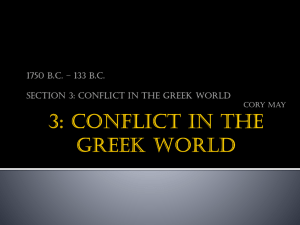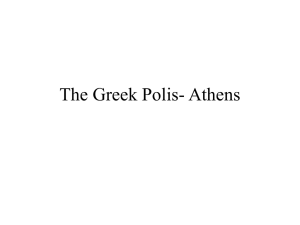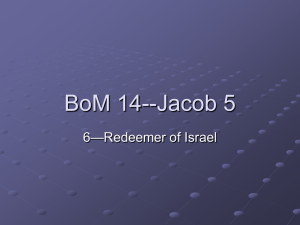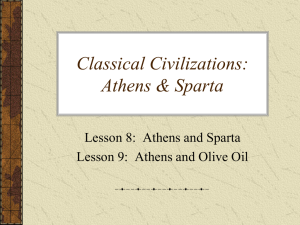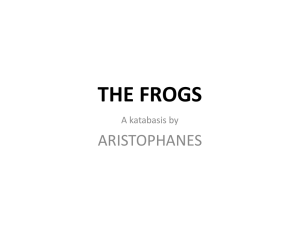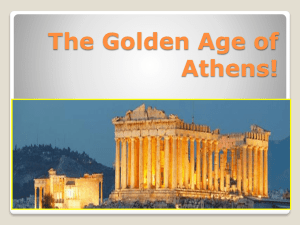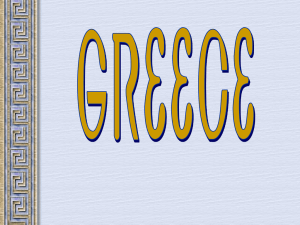Athens and Olive Oil - MSH - Council for Economic Education
advertisement
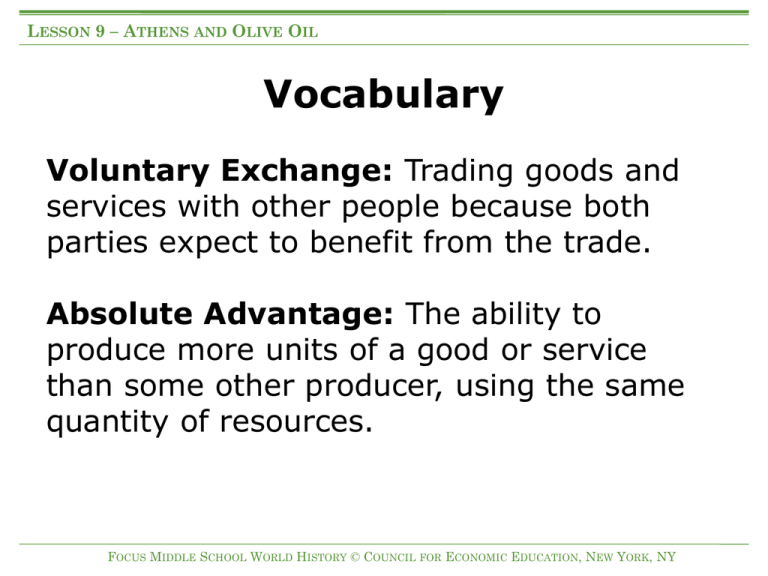
LESSON 9 – ATHENS AND OLIVE OIL Vocabulary Voluntary Exchange: Trading goods and services with other people because both parties expect to benefit from the trade. Absolute Advantage: The ability to produce more units of a good or service than some other producer, using the same quantity of resources. FOCUS MIDDLE SCHOOL WORLD HISTORY © COUNCIL FOR ECONOMIC EDUCATION, NEW YORK, NY LESSON 9 – ATHENS AND OLIVE OIL Vocabulary Comparative Advantage: The ability to produce a good or service at a lower opportunity cost than some other producer. This is the economic basis for specialization and trade. Opportunity Cost: The highest valued alternative that is given up when a choice is made. FOCUS MIDDLE SCHOOL WORLD HISTORY © COUNCIL FOR ECONOMIC EDUCATION, NEW YORK, NY LESSON 9 – ATHENS AND OLIVE OIL In Athens: Producing one jar of olive oil meant giving up one-half bushel of wheat. The opportunity cost of is In Egypt: Producing one jar of olive oil meant giving up four bushels of wheat. The opportunity cost of is FOCUS MIDDLE SCHOOL WORLD HISTORY © COUNCIL FOR ECONOMIC EDUCATION, NEW YORK, NY LESSON 9 – ATHENS AND OLIVE OIL Comparative Advantage: The ability to produce a good or service at a lower opportunity cost than some other producer. Which country has the lower opportunity cost of producing olive oil? Which country has the comparative advantage in producing olive oil? Therefore, who should produce olive oil? FOCUS MIDDLE SCHOOL WORLD HISTORY © COUNCIL FOR ECONOMIC EDUCATION, NEW YORK, NY LESSON 9 – ATHENS AND OLIVE OIL In Egypt: Producing one bushel of wheat meant giving up one-fourth jar of olive oil. The opportunity cost of is In Athens: Producing one bushel of wheat meant giving up two jars of olive oil. The opportunity cost of is FOCUS MIDDLE SCHOOL WORLD HISTORY © COUNCIL FOR ECONOMIC EDUCATION, NEW YORK, NY LESSON 9 – ATHENS AND OLIVE OIL Comparative Advantage: The ability to produce a good or service at a lower opportunity cost than some other producer. Which country has the lower opportunity cost of producing wheat? Which country has the comparative advantage in producing wheat? Therefore, who should produce wheat? FOCUS MIDDLE SCHOOL WORLD HISTORY © COUNCIL FOR ECONOMIC EDUCATION, NEW YORK, NY LESSON 9 – ATHENS AND OLIVE OIL The articles which it is difficult to get, one here, one there, from the rest of the world, all these it is easy to buy in Athens. —Isocrates, Greek Orator (436–338 B.C.E.) The magnitude of our city draws the produce of the world into our harbor, so that to the Athenian the fruits of other countries are as familiar a luxury as those of his own. — Thucydides, Greek Historian (460–395 B.C.E.) FOCUS MIDDLE SCHOOL WORLD HISTORY © COUNCIL FOR ECONOMIC EDUCATION, NEW YORK, NY LESSON 9 – ATHENS AND OLIVE OIL Vocabulary Production Possibilities Frontier: A table or graph that shows the various combinations of two goods it is possible to produce with a given amount of resources. FOCUS MIDDLE SCHOOL WORLD HISTORY © COUNCIL FOR ECONOMIC EDUCATION, NEW YORK, NY LESSON 9 – ATHENS AND OLIVE OIL Athens’ Production Possibilities Table Athens All cards wheat Flip one card Flip second card Flip third card Flip last card Wheat Olive Oil 4 0 3 2 2 4 1 6 0 8 FOCUS MIDDLE SCHOOL WORLD HISTORY © COUNCIL FOR ECONOMIC EDUCATION, NEW YORK, NY LESSON 9 – ATHENS AND OLIVE OIL Athens’ Production Possibilities Graph FOCUS MIDDLE SCHOOL WORLD HISTORY © COUNCIL FOR ECONOMIC EDUCATION, NEW YORK, NY LESSON 9 – ATHENS AND OLIVE OIL Egypt’s Production Possibilities Table Egypt All cards wheat Flip one card Flip second card Flip third card Flip last card Wheat Olive Oil 16 0 12 1 8 2 4 3 0 4 FOCUS MIDDLE SCHOOL WORLD HISTORY © COUNCIL FOR ECONOMIC EDUCATION, NEW YORK, NY LESSON 9 – ATHENS AND OLIVE OIL Egypt’s Production Possibilities Graph FOCUS MIDDLE SCHOOL WORLD HISTORY © COUNCIL FOR ECONOMIC EDUCATION, NEW YORK, NY

